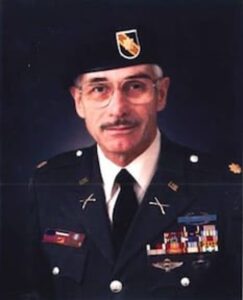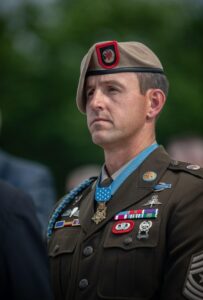Hershel “Woody” Williams was born on a dairy farm in Quiet Dell, West Virginia, in 1923. His parents, Lloyd and Lurenna, had previously lost several children in the 1918 influenza epidemic. Woody only weighed 3.5 pounds at birth — but miraculously survived. His fighting spirit, grit, and fierce determination would be a theme throughout his life.
At 18, Williams attempted to enlist in the Marine Corps but was rejected due to his shorter stature. When he tried again in May 1943, he was accepted — the height requirement had been waived. Williams first saw combat in Guam in 1944 before receiving orders to Iwo Jima in 1945. He could never have known the path he would follow, or the immense fortitude he would need to complete his dangerous and unprecedented task.
Trial by Fire
Williams recalled that the flag-raising at Mount Suribachi was a turning point for the Marines fighting on Iwo Jima. Their spirits — and their attitudes — were brighter, more hopeful. On February 23, 1945, Williams’ captain requested a meeting with his non-commissioned officers (NCOs) and remaining officers. “He called a meeting in a great big shell crater,” Williams said. The captain wanted to hear ideas about how to make progress in enemy territory without additional casualties. He looked at Williams and asked, “Do you think you can knock out some of those pillboxes with a flamethrower?”
Two riflemen and two automatic riflemen were instructed to protect and cover Williams as he carefully and deliberately crawled toward multiple Japanese pillboxes. Each compact, concrete structure was covered in several feet of sand and housed more than a dozen soldiers. As he bravely inched closer, bullets ricocheted off Williams’ air tank. But the closer he got to the pillboxes, the fewer number of bullets that grazed him. For more than four hours, Williams courageously moved from one pillbox to the next, torching each one with his flamethrower, incinerating those inside. Some of his memories of that day remained a vivid part of his memory. “Another pillbox, I was trying to get to it, and I couldn’t. Every time I would start, he [an enemy fighter] would get too close for comfort and I’d back out,” Williams said. “I crawled around out of his sight and up to the pillbox, went up the side, got up on top of the pillbox, and here was a pipe, just about the size of my flamethrower nozzle … I knocked that one out.” Throughout that day, Williams eliminated at least seven pillboxes.
But he wrestled with what he had done, and he struggled with his wartime experiences. “It’s one of those things you put in the recess of your mind. You were fulfilling an obligation that you swore to do — to defend your country. Anytime you take a life, there’s always some aftermath to that, if you’ve got any heart at all,” Williams told The Washington Post in a 2020 interview.
For his fearless gallantry and heroic service, Williams received the Medal of Honor on October 5, 1945. Humbled by the sentiment, he responded, “You’ve got a job to do for which you’re trained. You’ve got to do it for the people around you, for the other Marines. Two of them got killed protecting my life. This Medal belongs to them — it really doesn’t belong to me.”
A Lifetime of Dedicated Service
In 1945, Williams was discharged but served in the Marine Corps Reserve for 20 years. From then on, he embraced a life of dedicated service and citizenship. He served as the Medal of Honor Association chaplain for more than 30 years. Williams was also an inaugural member of the Congressional Medal of Honor Society, and the legislative bill to approve the Medal of Honor Monument on the National Mall was named in his honor.
In 2010, he founded the Woody Williams Foundation, which recognizes and honors the service of Gold Star Families and their beloved fallen heroes. According to the Foundation’s website, 140 Gold Star Memorial Monuments have been installed so far, and 47 are in progress, across all 50 states and one U.S. territory — to remember the heroic sacrifice of military service members.
In 2020, Williams attended the commission of USS Hershel “Woody” Williams (ESB-4), named in his honor. He was the last surviving World War II Medal of Honor Recipient until his death on June 29, 2022. Williams received the rare honor of lying in state at the U.S. Capitol, typically reserved for high-ranking government officials. He wanted to use this opportunity to represent every World War II Recipient who had bravely served and fought for their beloved country. Williams will be remembered for the immense value that he added to every person and community that he connected with.




